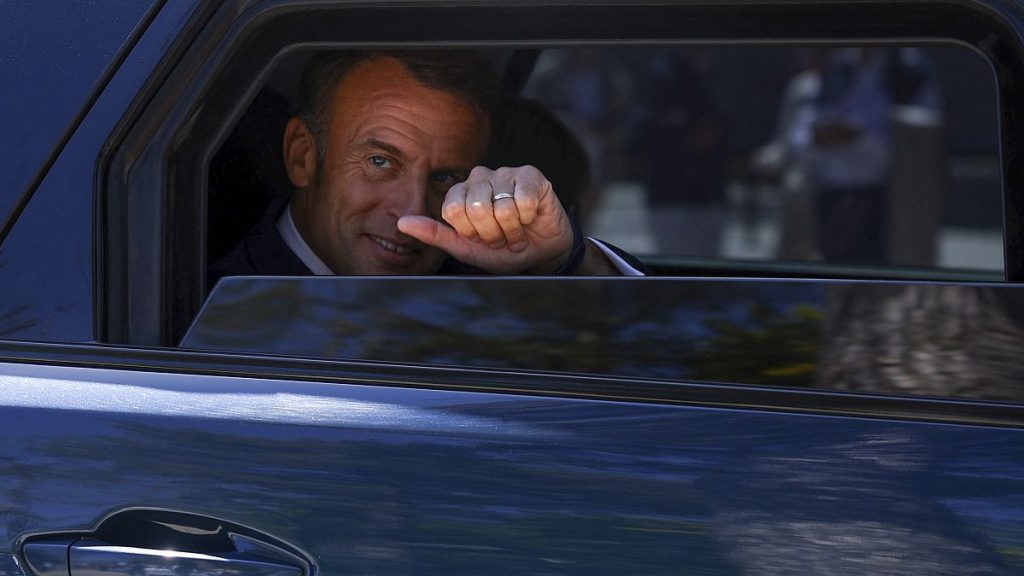Summarize this content to 2000 words in 6 paragraphs in Arabic
This edition of State of the Union focuses on the outcome of the European elections that led French president Macron to call for a national vote in a few weeks – plunging France into political uncertainty. Another topic: a week of intense diplomatic activity over Ukraine.
ADVERTISEMENTThe European elections are over – and the horse-trading over future alliances, coalitions and top positions has begun.In meetings, meetings and more meetings, the winners and losers of the verdict of the voters started to get themselves ready for the next five years of legislative battles.We’ll come back to that in a minute.But first: it was a week of intense diplomatic activity for Ukraine.President Volodymyr Zelenskyy traveled to the country’s Recovery Conference in Berlin, the G7 summit in Italy and a global peace summit in Switzerland.He appealed for short-term help in repairing Ukraine’s electricity network, long-term investment in its energy system and he renewed his calls for more help in repelling missile attacks by Russia.Thanking German lawmakers at the Bundestag for their continuing support, a defiant Zelenskyy made clear what he thinks about compromise with Moscow – and that is next to nothing:“Russia must be held accountable for the aggression of war. Russia must remove the ruins. Russia must pay for all the damage that has occurred in our country. (…) We will not allow Russia to continue to march through Europe with its contempt for life.”On a European level, support for Ukraine seems to be assured, as the European elections ushered in the same majority of centrist parties.At the same time, voters also strengthened the far right, as expected, especially in France.Marine Le Pen’s National Rally party scored spectacular gains and moved closer to the gates of power in Paris.This political earthquake let President Emmanuel Macron call for snap elections in just a few weeks.Some observers believed this to be a high-stake gamble. But Macron called upon moderate forces to unite against extremes on the right and on the left:“I am convinced that some among the Social Democrats, the Radicals (center left), the Greens, the Christian Democrats, the heirs of Charles de Gaulle (center right) and, more widely, that many of our fellow citizens and political leaders that don’t feel represented by the extremes could work together with their leaders to build a new project.”To discuss this week’s events we spoke to Jacob Kirkegaard, senior fellow at the German Marshall Fund and the Peterson Institute for International Economics.Euronews: So, the center held in the European elections, and their parties keep a solid majority. What can we expect now, will it be business as usual?Kirkegaard: I think it would be quite close to business as usual, actually. I think, for instance, that the process of selecting the next leadership team, I mean, the presidencies of the Commission, Council, High Representative, etc. I think that will go quite quickly, clearly led by the reappointment, in my opinion, of Ursula von der Leyen as president of the Commission, buoyed by the fact that, the EPP did well, the CDU did well in Germany. So, while you wouldn’t say that she has a strong democratic mandate behind her, but she nonetheless has better than any alternative candidates.Euronews: Let’s assume that you’re right Parliament will re-elect Ursula von der Leyen as Commission president, will she try to reach out to the far right and what impact will that have on her political agenda?ADVERTISEMENTKirkegaard: No, I don’t think that would be her first strategy. She still has a majority, based on the Liberals, centre right, centre left. On top of that, we should remember that the Green Party were among those that suffered significant losses in this election. What that means is that the Greens, who clearly will be fearful that Ursula von der Leyen in a new term will water down aspects of the Green Deal. Well, they need to seek influence more than they did before because they are fewer in numbers. So, if she needs to reach out, well, I would say the Greens would be a much better opportunity because it wouldn’t really cost her very much, in my opinion, in terms of support from within her own party and others.Euronews: The real shocker, of course, was Emmanuel Macron calling for snap elections in just a few weeks. What do you expect is going to happen there?Kirkegaard: Well, let me guess. The irony here is that the European election seems to have caused more waves at some national levels, first and foremost, of course, France. No, I mean, I think, we’re now in that period of acute uncertainty for France. The French parliamentary election system is a two-round system. That makes it very difficult to predict. It puts a premium on these party coalition agreements. And we’re seeing those, being struck and then unstruck. We saw the Republicans, or at least the leader of the Republicans, Eric Ciotti, trying to gang up with Le Pen. We saw similar moves for a new Front Populaire on the left. Except that the winner, the left wing vote-getter, in the European election, Glucksman, said: “Without me”. So, it’s very, very unclear what will happen.
rewrite this title in Arabic State of the Union: EU elections plunge France into uncertainty
مقالات ذات صلة
مال واعمال
مواضيع رائجة
النشرة البريدية
اشترك للحصول على اخر الأخبار لحظة بلحظة الى بريدك الإلكتروني.
© 2025 جلوب تايم لاين. جميع الحقوق محفوظة.


